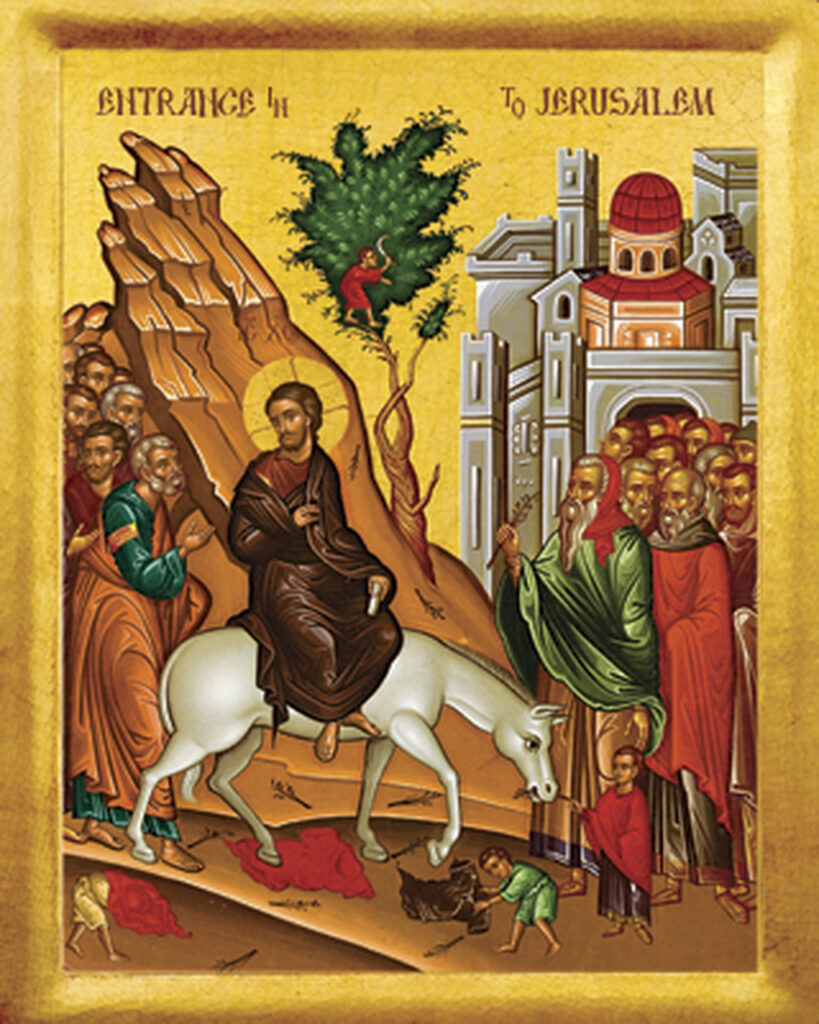In the name of the Father, and of the Son, and of the Holy Spirit, one God, Amen.
Throughout the Gospels, dear brothers and sisters in Christ, the Lord teaches and heals many yet it is rare for him to raise the dead—only Jairus’ daughter (Matthew 9:18–26, Mark 5:21–43, Luke 8:40–56), the son of the Widow of Nain (Luke 7:11–17) and Lazarus (John 11:1–44) are mentioned by the Evangelists. The Lord shows himself as having power over Death itself, the last enemy (First Corinthians 15:26), and so a crowd came—specifically because of Lazarus’s raising—for “The reason why the crowd went to meet [Christ] was that they heard he had done this sign [this miracle].”
You and I, dear brothers and sisters, have been raised as if from the dead. We have heard the Gospel and been brought back to life, back to wholeness, and we cry out “Hosanna! Blessed is he who comes in the name of the Lord, even the King of Israel!” Yet are we satisfied with this? Are we limited by this? Do we want merely to be brought back to life according to the standards of this life? For Jairus’ daughter, for the son of the Widow of Nain, for Lazarus, would all return to the grave, return to the earth, return to dust. Do I want to have a mere second chance at this life or do I want true life, eternal life?
The Lord comes as a conquering King unlike any in human history. His Gospel is one inviting his subjects to become co-heirs with him, that we might co-reign with him in his Kingdom. And he comes not to take possession of a human city but in humility he comes to take our hearts if we will offer them to him.
And with all this on offer—to be co-rulers in the Heavenly Kingdom, “where neither moth nor rust destroys and where thieves do not break in and steal,” (Matthew 6:20)—we must make a choice, do I want to be raised as Lazarus here and now or do I want to be resurrected for the Kingdom?

My dear brothers and sisters in Christ, the Lord is not calling us to a mere raising in this life where the Church serves us and helps us through the trials and difficulties which we face but that we be resurrected for the next life. And to be resurrected we must make today’s Entrance into Jerusalem alongside Christ, that we too be lifted up on our crosses through serving others because of our love for them, so that the third-day Resurrection may be ours. Let us serve others, help others, support others, feed others, clothe others, welcome others, engage with others that our Lord may be glorified and we joined to his glory.
Let us ever praise and honour our risen Lord and Saviour Jesus Christ, who demonstrates to us how to lead through service, together with his unoriginate Father and the All-holy, Good and Life-giving Spirit. Amen.
Brethren, rejoice in the Lord always; again I will say, Rejoice. Let all men know your forbearance. The Lord is at hand. Have no anxiety about anything, but in everything by prayer and supplication with thanksgiving let your requests be made known to God. And the peace of God, which passes all understanding, will keep your hearts and your minds in Christ Jesus. Finally, brethren, whatever is true, whatever is honorable, whatever is just, whatever is pure, whatever is lovely, whatever is gracious, if there is any excellence, if there is anything worthy of praise, think about these things. What you have learned and received and heard and seen in me, do; and the God of peace will be with you.
— Philippians 4:4–9
Six days before Passover, Jesus came to Bethany, where Lazarus was, whom Jesus had raised from the dead. There they made him a supper; Martha served, and Lazarus was one of those at table with him. Mary took a pound of costly ointment of pure nard and anointed the feet of Jesus and wiped his feet with her hair; and the house was filled with the fragrance of the ointment. But Judas Iscariot, one of his disciples (he who was to betray him), said “Why was this ointment not sold for three hundred denarii and given to the poor?” This he said, not that he cared for the poor but because he was a thief, and as he had the money box he used to take what was put into it. Jesus said, “Let her alone, let her keep it for the day of my burial. The poor you always have with you, but you do not always have me.” When the great crowd of the Jews learned that he was there, they came, not only on account of Jesus but also to see Lazarus, whom he had raised from the dead. So the chief priests planned to put Lazarus also to death, because on account of him many of the Jews were going away and believing in Jesus. The next day a great crowd who had come to the feast heard that Jesus was coming to Jerusalem. So they took branches of palm trees and went out to meet him, crying, “Hosanna! Blessed is he who comes in the name of the Lord, even the King of Israel!” And Jesus found a young donkey and sat upon it; as it is written, “Fear not, daughter of Zion; behold, your king is coming, sitting on a donkey’s colt!” His disciples did not understand this at first; but when Jesus was glorified, then they remembered that this had been written of him and had been done to him. The crowd that had been with him when he called Lazarus out of the tomb and raised him from the dead bore witness. The reason why the crowd went to meet him was that they heard he had done this sign.
— John 12:1–18
